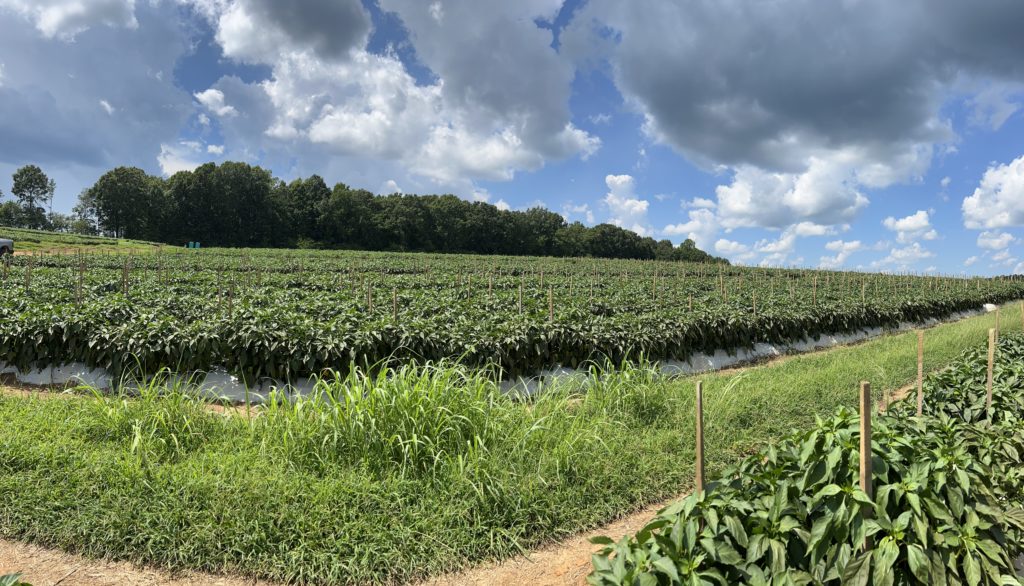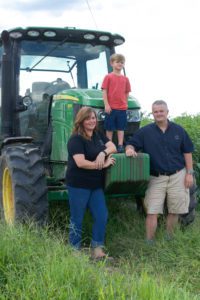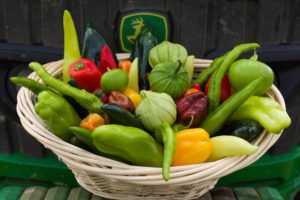
Oct 1, 2022Life lessons help Bailey Farms succeed with hot peppers
Specialty peppers are a hot business for Bailey Farms in Oxford, North Carolina.
Bailey Farms grows 17 varieties of hot peppers at Oxford, as well as in Georgia and Florida on 1,200 of its own and contracted acreage.
Business has grown so fast during the COVID years that Bailey Farms had to keep a lid on things to avoid producing more than it could handle, said Randy Bailey, owner and president. At times, the farm couldn’t keep up with demand, which has since moderated.

“With the way costs are, it’s too expensive to take on new business,” Bailey said. “We’re trying to keep going with what we can and are trying to get pricing up from our customers. It seems like every time we ask for a price increase from our customers, we need another one.”
Growing peppers is expensive, requiring vigilance against pests and diseases. Being thrifty with inputs and expenses – even before inflation and skyrocketing costs of inputs – it’s even more important today.
“We have always tried to utilize less fertilizer and the least fuel as we can,” said Bailey. “It’s driving the costs per-acre to grow. There’s nothing you can do about it, so your risk is also increasing.”
Conserving inputs
To save on pesticides, Bailey Farms uses Integrated Pest Management to control pepper weevils and thrips. Bacteria leaf spot and phytophthora root rot issues can bedevil peppers.
“These fungicides and pesticides, you never want to use more than you need and will want to go lightly, if you can,” Bailey said. “The more of those kinds of things you use, especially pesticides, the more you will need to attain, because they will knock out your beneficial insects.”
The farm applies even amounts of crop protectants under plastic mulch and nurses plants by applying nutrients through water. Tissue analysis shows fertilizer volumes the plants require, including deficiencies and overabundances. Some crop protectants removed from growers’ arsenals makes growing a little more challenging, Bailey said.
To conserve water use, Bailey in 2019 invested in computerized irrigation. The fertigation system distributes water more efficiently. The technology has reduced expenses by saving fuel and water and potentially fertilizer, and increased yields.
Bailey’s next planned investment is mechanical harvesting equipment to counter labor costs. The company is eyeing different systems, one of which shows promise but requires adjustment. “We are a long ways from automation, but it will become incrementally better through mechanical methods,” Bailey said.
Extension assist
Bailey works closely with NC State Extension and seed companies for improved varieties and growing practices.
“We do extensive trials throughout the year to look at and see what’s new and upcoming,” he said. “If we see something we like, we put more of it in. We try to be the first whenever we can when we find something good. It takes years to develop those things.”
To avoid production gaps and overlaps, Bailey Farms plants varieties that work best in each marketing window. It grows on 600 acres near Fort Myers, Florida, and works with contracted growers in Plant City and Quincy, Florida, and Tifton, Georgia.

Bailey Farms’ pepper lineup includes Anaheims, Cherry Hots, cubanelles, Finger Hots, habañeros, Hungarian waxes, jalapeños, Long Hot cayennes, poblanos, Red Fresnos, serranos and Shishito chilis. It also grows BellaFinas, known for their sweet taste, and sweet mini peppers and tomatillos. Of those, jalapeños, BellaFinas and sweet mini peppers constitute the largest production.
When he was 21, Bailey decided to grow hot peppers after gaining a taste for the flavors of spicy Mexican food. In 1989, he and his father, Thomas, grew only a few acres their first year with production limited to the summer. In the next several years, business grew slowly. In the late 1990s, the Baileys worked with other growers to help them supply peppers throughout the year. In 2002, business exploded and was six times larger than just four years before, with the rapid growth presenting new challenges.
Proper planning key
“We’ve always been big on knowing if we have a home for our product before we plant it,” Bailey said. “Never grow more than you can afford to lose. It’s gotten so expensive to grow these days with the risks in the market.”
Bailey’s wife, Debbie, manages the financial side of the business while Randy runs production and operations. Their 12-year-old son, Ryan, is becoming involved in the family operation.
Bailey learned much about hard work and crop management from his father, who lost everything in a 1988 bankruptcy. In Thomas’s operation, he handled finances and operations while the two split duties in their partnership.
The bankruptcy affected Randy Bailey deeply. “It made an impression that to do this business, you need to protect yourself from that (bankruptcy) as best you can,” he said. “That told me I needed to do things differently if I wanted to make it.”
In 2002, Thomas Bailey died in a farm accident. Fumigating when laying plastic and mulch, a malfunctioning methyl bromide tank exploded when Thomas was standing over it. He was 66.
“He was not only my business partner and farmer, he was my best friend,” Randy Bailey said. “He had a profound effect on me. It made me determined to make sure this thing worked.”
Growing up on a farm, Bailey learned many life lessons.
“It teaches you the work ethic and that a hard day’s work isn’t a bad thing,” he said. “To be able to look back on what you’ve done and see the outcome is very rewarding.”
— Doug Ohlemeier, assistant editor
Top photo: Bailey Farms grows 17 varieties of specialty peppers in three states, including mini sweet peppers, shown here. PHOTOS: Bailey Farms
Middle photo: Debbie and Randy Bailey, of Bailey Farms, with their son Ryan. The family operation grows peppers in North Carolina, Georgia and Florida.
Bottom photo: A sampling of the varieties of specialty peppers grown by Bailey Farms.
















